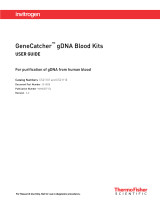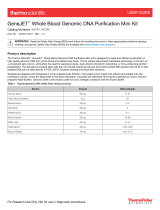Page is loading ...

PureQuant™ Treg Assay
Catalog Number A43675
Pub. No. MAN0018287 Rev. C.0
WARNING! Read the Safety Data Sheets (SDSs) and follow the handling instructions. Wear appropriate protective eyewear,
clothing, and gloves. Safety Data Sheets (SDSs) are available from thermofisher.com/support.
Product description
The Applied Biosystems™ PureQuant™ Treg Assay is a TaqMan™ PCR-based assay, which measures genomic DNA demethylation at a
unique site of FoxP3 gene, that in turn serves as an identier of Regulatory T cells (Treg) in a heterogeneous population. Genomic DNA
isolated from cells is rst subjected to bisulte conversion followed by qPCR using methylation specic primers. The assay utilizes
Standards for estimating copy number. Calibrator and Reference serve as controls. Each 96‑well qPCR plate can accommodate from 1 to
7 test samples.
Contents and storage
Table 1 PureQuant™ Treg Assay, (Cat. No. A43675)[1]
Contents Amount Storage
Dynabeads™ SILANE Genomic DNA Kit
• Lysis Binding Buffer
• Dynabeads™ magnetic beads
• Wash Buffer 1
• Wash Buffer 2
• Elution Buffer
1 Box 4°C
PureQuant™ qPCR Master Mix 1 × 2 mL 4°C
PureQuant™ qPCR Bisulfite Conversion Reagents
• PureQuant™ Ammonium Bisulfite
• PureQuant™ THFA
1 Box
4 × 2.5 mL
1 × 3.5 mL
RT
PureQuant™ Treg Module
• PureQuant™ High Copy Standard A
• PureQuant™ Reference Genomic DNA
• PureQuant™ Calibrator A
• Lambda DNA
• TaqMan™ GAPDH Assay
• TaqMan™ FoxP3 Assay
1 Box
1 mL
6 µg
350 µL
1.7 mL
200 µL
200 µL
−20°C
[1] PureQuant™ Treg Assay is only available as a complete kit. Individual components are not sold separately.
USER GUIDE
For Research Use Only. Not for use in diagnostic procedures.

Required material not supplied
Unless otherwise indicated, all materials are available through thermofisher.com. MLS: Fisher Scientic (fisherscientific.com) or other
major laboratory supplier.
Item Source
Reagents
PureLink™ Genomic DNA Mini Kit K1820-01
2‑Propanol MLS
Ethanol MLS
TE, pH 8.0 MLS
Instruments and equipment
HulaMixer™ Sample Mixer 15920D
DynaMag™‑2 Magnet 12321D
Eppendorf™ ThermoMixer™ C and SmartBlock™ 2 mL Eppendorf™; 5382000023 and 5362000035
Eppendorf™ Safe-Lock Tubes, 2.0 mL Eppendorf™; 022363344
Real Time-PCR Machine MLS
IMPORTANT! The performance of this assay has been validated using a Eppendorf™ ThermoMixer™ C temperature control device. A dry
heat block can be used as an alternative. However, use of the Eppendorf™ ThermoMixer™ C is recommended for most consistent results.
Assay overview
Guidelines to isolate genomic DNA and prepare
samples
• Use the 2 mL Safe-Lock tubes for sample preparation.
• Use the Elution Buffer supplied with the Dynabeads™ SILANE
Genomic DNA Kit.
• Do not add water into the Eppendorf™ ThermoMixer™ C with
SmartBlock™ wells or heat block.
Isolate genomic DNA and prepare sample
1. Isolate genomic DNA from 1–2 × 106 cells using PureLink™
Genomic DNA Mini Kit and check the purity of gDNA using a
spectrophotometer or NanoDrop™ spectrophotometer.
The OD260/280 and OD260/230 of your gDNA should fall within
the specied ranges:
(OD260/280:1.7–2.0 and OD260/230:1.5–2.4)
2. Prepare Sample, Calibrator, and Reference in 2 mL tubes
according to the Table:
Item Amount/volume of
DNA
Make up the
volume w/ Elution
Buffer to
Sample 400–1200 ng 142 µL
PureQuant™
Calibrator A
75 µL 142 µL
PureQuant™
Reference Genomic
DNA[1]
1000–1200 ng 142 µL
[1] Take 1 µL PureQuant™ Reference Genomic DNA and estimate the
concentration using TE (pH 8.0) as blank. Expected concentration range
between 150–250 ng/µL).
3. Incubate at 56°C for 5 min with gentle shaking (900 rpm)
with a Eppendorf™ ThermoMixer™ C with 2 mL SmartBlock™
(or dry bath with 2 mL block).
4. Briey spin down the samples.
5. Adjust the Eppendorf™ ThermoMixer™ C (or dry heat block)
temperature to 80°C for the bisulte conversion.
2PureQuant™ Treg Assay User Guide

Guidelines for bisulfite conversion
• During bisulte conversion, follow the recommended
incubation times as over-incubation or under-incubation will
impact the assay result.
• Bring Lysis Binding Buffer and Dynabeads™ magnetic beads
to room temperature before use.
• Make a homogeneous suspension of Dynabeads™ magnetic
beads before use.
Perform bisulfite conversion
1. Add 270 µL ammonium bisulte and 90 µL THFA to the
Samples, Calibrator, and Reference.
Vortex thoroughly and briey spin down the samples.
2. Eppendorf™ ThermoMixer™ C: Incubate at 80°C for
45 minutes with gentle shaking (900 rpm). Briey centrifuge
to spin down the samples and allow them to cool down to
room temperature before proceeding to the next step.
OR
Heat block: Incubate at 80°C for 45 minutes with
intermittent vortexing for 1–2 seconds at 4.5‑minute
intervals. Minimize any delay that may occur during
vortexing. Briey spin down the samples at the end of the
45 minute incubation. Allow samples to cool down to room
temperature before proceeding to the next step.
3. Add 870 µL Lysis Binding Buffer and 105 µL Dynabeads™
magnetic beads from the (Dynabeads™ SILANE Genomic
DNA Kit) to each reaction.
4. Mix thoroughly by vortexing and briey spin down the tubes.
5. Add 570 µL of 2‑propanol and vortex thoroughly.
6. Incubate at room temperature for 7 minutes on a rotating
mixer or HulaMixer™ Sample Mixer under constant vertical
rotation (50 rpm).
7. Briey spin down the tubes and place them in the
DynaMag™‑2 Magnet for 5 minutes.
8. While in the magnetic rack carefully pipette off the
supernatant without transferring beads.
Note: The beads contain the DNA.
Guidelines to purify DNA
• Bring Wash Buffers and Elution Buffer from Dynabeads™
SILANE Genomic DNA Kit to room temperature before use.
• Vortex sufciently to ensure that beads are resuspended
completely in each wash.
• Remove any residual Wash Buffer 2 before drying the beads
at 65°C.
• Add ethanol and isopropanol to the wash buffers as
recommended on the bottles.
Purify DNA
1. Remove the tubes from the magnetic rack and add 900 µL
of Wash Buffer 1.
2. Vortex at maximum setting to make sure that beads are
resuspended completely.
Briey spin down the tubes.
3. Place the samples in the magnet for 3 minutes.
4. While the tubes are in the magnet, remove the supernatant
without transferring beads.
5. Repeat the washing (steps 1–3) with Wash Buffer 1.
6. Add 900 µL of Wash Buffer 2.
7. Resuspend the beads completely by vortexing.
Briey spin down the tubes.
8. Place the samples in the magnet for 3 minutes.
9. While the tubes are in the magnet, remove the supernatant
without transferring beads.
10. Add 400 µL Wash Buffer 2.
11. Resuspend the beads completely by vortexing.
Briey spin down the tubes.
12. Place the samples in the magnet for 3 minutes.
13. While the tubes are in the magnet, remove the supernatant
without transferring beads.
Briey spin down the tubes.
14. Place the samples in the magnet for 3 minutes.
15. Remove any residual Wash Buffer and remove the tubes
from the magnetic rack.
16. Dry the beads with the lid open at 65°C for 15 minutes in a
Eppendorf™ ThermoMixer™ C (or a dry-bath).
17. Add 60 µL Elution Buffer.
18. Incubate at room temperature for 7 min under constant
shaking (1400 rpm) in the Eppendorf™ ThermoMixer™ C, or
use a vortex with a foam adapter at moderate speed.
19. Place the tubes in the magnet for 2 minutes.
20. Carefully transfer the eluate (55 µL) to a fresh tube. The
eluate contains bisulte-converted DNA that is used in
subsequent qPCR.
PureQuant™ Treg Assay User Guide 3

Guidelines for setting up qPCR
• Refer to instrument user manual for instructions
programming qPCR run with Standard Curve.
IMPORTANT! Assign all the standard dilutions as "Standard."
Assign samples, negative control and reference as "Unknown";
and no template control as "NTC or N" in triplicate.
IMPORTANT! While assigning wells for each standard, provide
copy number that are specied in the Final Copy Number column
(see “Make standard dilutions”).
• Use the same six standard dilutions for both FoxP3 and
GAPDH Standards.
• All Samples, Standards and Controls are run in triplicate.
Make standard dilutions
Prepare a full panel of six standard dilutions by serially diluting the
PureQuant™ High Copy Standard A starting at 31250 copies/3 µL
according to the Table. The same standard dilutions are used for
both FoxP3 and GAPDH in qPCR. Store standard dilutions at
−20°C.
Initial plasmid
Copy
Number/3 µL
Volume Diluent
DNA[1]
Final
Copy
Number
per 3 µL
Label
31250 1000 µL — 31250 STD#1
31250 200 µL 800 6250 STD#2
6250 200 µL 800 1250 STD#3
1250 200 µL 800 250 STD#4
250 200 µL 800 50 STD#5
1250 30 µL 1200 30 STD#6[2]
[1] 10 ng/µL Lambda DNA in TE (10 mM Tris, 1 mM EDTA, pH 8.0)
[2] Use STD#3 to prepare STD#6.
Prepare PCR plate
1. Prepare the qPCR Master Mix Cocktail in two separate
tubes, one each for FoxP3 and GAPDH, excluding Template
DNA according to the Table:
Reagent Amount
Template DNA 3 µL
Lambda DNA (50 ng/µL in TE, pH 8.0) 1 µL
TaqMan™ assay 0.5 µL
Nuclease-free Water 0.5 µL
PureQuant™ qPCR Master Mix 5 µL
TOTAL 10 µL
2. Load the templates rst and then add 7 µL master mix
cocktail.
Figure 1 A representative 96-well plate layout illustrating
FoxP3 assay set up
Note: All Samples, Standards and Controls are run in triplicate.
3. Seal the plate with lm and briey centrifuge before placing
into the qPCR instrument.
4. Select FAM or equivalent as dye and Non Fluorescent
Quencher (NFQ) or equivalent as quencher.
Table 2 qPCR cycle setup parameters
Step Time Temp Cycles
Pre-incubation 35 min 95°C 1X
Amplification
15 sec 95°C
50X
1 min 61°C
Cooldown 5 sec 42°C 1X
5. Run qPCR using the cycle set up parameters listed in
Table 2.
IMPORTANT! See “Guidelines for setting up qPCR” for
instructions on setting up the qPCR standard curve and
other controls.
6. After the qPCR run is complete, execute analysis on the
qPCR instrument to calculate: Ct Average, Ct Standard
Deviation, and Copy Number. Export data in .txt or .xlsx
format.
7. Analyze data using PureQuant™ Treg Assay Microsoft™
Excel™ Analysis Template. Download Analysis Template from
thermofisher.com/order/catalog/product/A43675.
The analysis template has three tabs: Tab#1 contains
instructions and guidance on how to perform data analysis,
Tab#2 is the Analysis Template, and Tab#3 contains an
Example.
Limited product warranty
Life Technologies Corporation and/or its afliate(s) warrant their
products as set forth in the Life Technologies' General Terms and
Conditions of Sale at www.thermofisher.com/us/en/home/
global/terms-and-conditions.html. If you have any questions,
please contact Life Technologies at www.thermofisher.com/
support.
4PureQuant™ Treg Assay User Guide

Life Technologies Corporation | 5781 Van Allen Way | Carlsbad, CA 92008
For descriptions of symbols on product labels or product documents, go to thermofisher.com/symbols-definition.
The information in this guide is subject to change without notice.
DISCLAIMER: TO THE EXTENT ALLOWED BY LAW, THERMO FISHER SCIENTIFIC INC. AND/OR ITS AFFILIATE(S) WILL NOT BE LIABLE FOR SPECIAL, INCIDENTAL, INDIRECT,
PUNITIVE, MULTIPLE, OR CONSEQUENTIAL DAMAGES IN CONNECTION WITH OR ARISING FROM THIS DOCUMENT, INCLUDING YOUR USE OF IT.
Important Licensing Information: These products may be covered by one or more Limited Use Label Licenses. By use of these products, you accept the terms and conditions of all
applicable Limited Use Label Licenses.
©2020 Thermo Fisher Scientic Inc. All rights reserved. All trademarks are the property of Thermo Fisher Scientific and its subsidiaries unless otherwise specified.
thermofisher.com/support | thermofisher.com/askaquestion
thermofisher.com
12 February 2020
/









